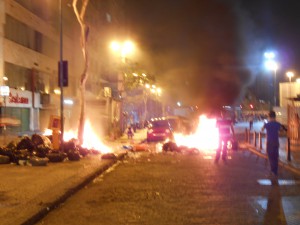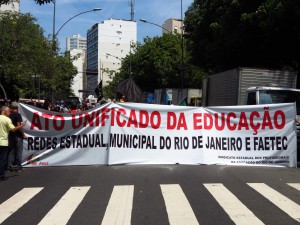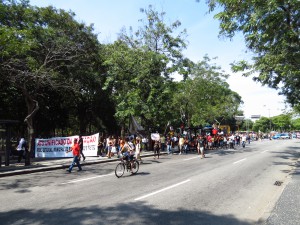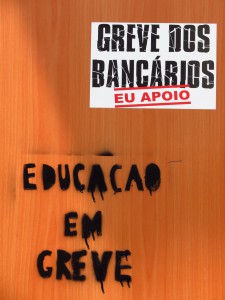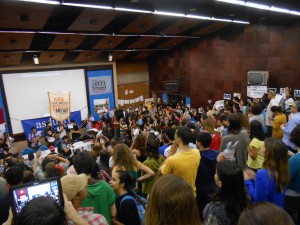Long time has passed since my last (and first) post in this blog and many things have happened. Shall we start with order: because it was an intense period, I decided to present in chronological order the summary of the most important days.
27th September – the flight and my arrival
I start my long trip that will let me in Brazil at my house in Leeds, at 6.30. A fast goodbye to my partner and my life here and here we are: the journey has started!
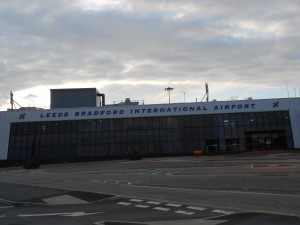 Leeds Bradford International Airport: here we are!
Leeds Bradford International Airport: here we are!
Taxi to the airport and three things are on my mind: first, when I will be back?; second, how will this period in Brazil be?; third (and maybe the more important), what did I forget this time? Did I take everything? Did I miss to do or to take something fundamental? From Leeds airport to London Heathrow: here I wait for two hours, taking advantage of the free Wi-Fi and dealing with the traditional 30 daily emails on my various e-mail account. I strongly believe that more that 20 % (more?) of our commitment as a researcher or employees in the academia is dealing with e-mails. I change terminal (this airport is huge) and I get in the second (and last) flight for Rio de Janeiro. Long hours in the airplane, unfortunately I am in the central seat of the central row: I cannot take photos from the windows (I was planning to take photos to show the different settlements between Leeds/London/Rio), if I want to move I have to inconvenience all my neighbours and I cannot stretch much my legs. I read a free English tabloid, for the sake to read something (flashing my kindle and reading something for the research seems a bit too much) and then I try to sleep, thinking of all the carbon emission of my journey. I am one of that person that is using the bike every day, paying attention to the division of the garbage, if I have move around the house I try to use the light as less as possible (sometimes with hilarious and disastrous consequences…), in short I can be define a “good green boy” then, this year, I abundantly used flights for various conference and fieldwork around the world (USA, Greece, UK, Brazil, Italy). How can a green-lifestyle deal with the necessity of so many movements by flight? Are they so necessary?
Back to the flight: I discovered that the woman next to me is Brazilian, fluent in English, French and Italian. I had the chance to use my Portuguese: it is not so bad! This is one of my nightmares: that with these two months in Europe I forget all my Portuguese. Indeed, when I was back in UK at the beginning of September I discovered that after six months relatively speaking no-English, my communication skills have decreased considerably. So much efforts and energy to learn a language and then everything disappear: maintaining language skills at a decent level is a continuous fight as it is to learn it!
Then, after many hours (and not enough food): Rio de Janeiro. Quick check of passport: I am here with a research visa and the policeman asks me if I am a doctor (why? it is clearly written than I am linked with a geography department!). Never mind, now I have to face the scariest part of the entire journey: will my luggage appear from the small hole on the long mobile track? Have it flight with me or it is lost somewhere? After few minutes of anxiety I can see it: I collect it and then quickly to a taxi for the city centre. It is night, 9 pm local time and everything is dark; I can see only the lights of the big metropolis and, with my pleasure, I can still recognize and remember the name of different streets and neighbourhoods. It seems that nothing has changed (was I expecting that the city has changed in less than two months from my departure?), maybe the biggest change is that the anti-riot protection on banks and State’s building are less visible; the silent taxi driver explains me that the protests have cooled down a bit. I arrived easily to the house where some my good friend will host my in the first period and my first request after the greetings is a shower: after the long journey I really need it!
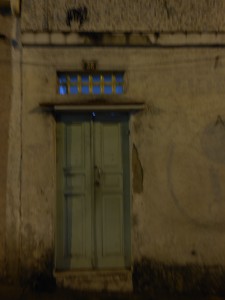 the door of my new house in Rio de Janeiro
the door of my new house in Rio de Janeiro
The person who is hosting me is travelling now to San Paolo for the weekend and I decided to go with her to the coach station. Doing so, I immerse immediately myself in the local life: the dramatic bus ride and the “rough” coach station that scared me months ago (I will return on these aspects in the future). I (safely) return back home and I collapse at 1.30, local time, 5.30 UK time. Now, I am really back in Rio de Janeiro.
First week-end back in Rio de Janeiro
First week-end and I manage to do some basic stuff for the first days back: re-gaining confidence with the language, discovering the neighbourhood and the markets, buying some food. Moreover I am invited to two parties and I have the chance to see many old friends (all involved in different social movements), all very happy to see my back and I start to speak about my research and to ask everyone if they have a room available for me: searching a house will be my main occupation for the next week. Unfortunately the weather is not great and I cannot get to the famous beach and enjoy the sun before my days become too busy.
30th September – Back to the old routine…
One of the firs things that I try to do is to get back to the old routine that I had in Rio previously: I discovered that a routine, a schedule, help me to give structure to the day, pushing me to do the research and not leaving enough time for sadness or bad feelings. Today is Monday and it is perfect to start a new week back to my routine. In the early morning I get used to do physical activity and, because I really like martial arts, I jump on the opportunity to do Brazilian ju-jitsu in one of the best school of the world (it is in Copacabana, far, this is the only problem). Many times I wondered if this activity is losing time for my research but I arrived to the conclusion that it does not help me to be fit but it is something more. Being continuously in the fieldwork is high creates a constant pressure on me: I must do my research, I must have enough data for when I am back, every day I have a long list of things to do, alone, in a country that is not mine and with a different language from my mother tongue. A physical activity helps me to take a break, cleaning my mind and then concentrating again on the research (and, as a precious exercise, I also have to speak/understand a Portuguese from the street). At the gym all the people are very happy to see me again, it is like a big family.
Then, in the evening, I am back in the routine in an unexpected way: since the beginning of August the public teachers are on strike and there is a static demonstration in from of the city council, pushing demanding the blocks of a school reform that has not been discussed with the category. It is only Monday and I have already the opportunity to be back in the streets, place of many demonstrations in the past months.
 Also the bankers are on strike
Also the bankers are on strike
I arrive in Cinelandia square in front on the Câmara Municipal do Rio de Janeiro (Municipal Chamber of Rio de Janeiro) where there is the static demonstration, around 2000-3000 people, mainly professors and young, some can be associated with the black bloc. On the steps of the Camera the camps of “Occupy Camera” continues, in the style of Occupy Wallstreet, with many banners around and more or less 20 tends (from what I understand it is a legal camp). 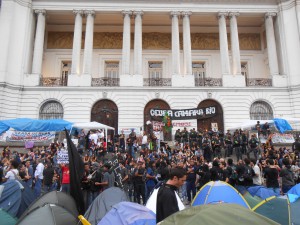 the Ocupa Camara in Cinelandia square
the Ocupa Camara in Cinelandia square
I see many friends, all very happy to meet me, and also some Brazilian fellow of the project Contested Cities. The situation seems peaceful and joyful, many people with placards, like all Brazilian events, with thousands of messages but all focus for a better school system, against local politicians, against police violence. However, the police are quite nervous and attempt to do several arrests for futile reasons (e.g. launching a bit ‘of water against a police car). In protest , it was decided to occupy the intersection of Rio Branco, one of the main arteries of the city centre and after a while ‘ part of a procession composed of more than 500 people more militant towards the city centre , as always followed closely by the police. After 200 meters, in front of an office building which is often what happens: An unidentified person throws stones at the large windows and runs. Everyone in the procession is wondering why the action: it is clearly a provocateur and this fact to the police the excuse to begin clamping down. They leave the office with his nightstick , sonic bombs , gas … The procession breaks up into a thousand, I find myself running through the streets of downtown, known for a near video – magazine photographer A Nova Democracia, author of a number of great video on the protests. There is great confusion: people running in different directions, in different ways, police chases, you do not understand what to do. I’m going back to Cinelandia and there that most of the people regroup.
some barricades on fire
The police began to indiscriminately throw bombs to clear the square: it is not clear what is the motivating factor, it would seem that they do not appreciate a large number of people in the square, the number of people and the situation calms down; many people are worried to maintain the encampment of Occupy Camera but the police do not evict them. A group decides to bring solidarity to persons detained in the police station in Lapa and part in the parade. I continue with them and the resounding chorus is “What a coincidence, there is no police, there is no violence”. I remain an hour, the police check the road armed with submachine guns, the situation is paradoxically relaxed. I returned home around midnight: as a first day of the week it was challenging.
1th October – Riot
Today is a big day: it is scheduled a march of professors in the morning then a static demonstration in Cinelandia for all the afternoon, hoping that the proposed law is blocked; my plan is to go in the morning, then come back home for a rest and then return back in the afternoon; for this reason I do not have much things with me in my bag. In the morning I go to Largo do Machado, where the march starts. In the streets around 1000 professors and few young/students. I am in photographers’ mode: with the good camera owned by my University I try to take as many pictures as possible.
the march
Many placards, many banners, and many slogans: the sun is shining (and for me it is getting quite warm…) and the situation seems very positive. The people in the streets are supportive and there is very few police who is mainly controlling the traffic; some are doing graffiti in support of the teachers strike.
The march ends in Cinelandia: looking at the square from the steps of the Camera it seems that we are more than 2000! In the kitchen of the occupation people are serving some free food and, while speaking with some friends, I start eating some of the food that I brought from home. Immediately confusion in the square starts: some policeman are trying to arrest a professors with a mask (recently it has been introduced a new low that forbid to wear masks in streets, except, of course, during the Carnival), some people run to grab the professor, the police hit some, pushing everyone, all the people grabbing the professor fall on the ground, destroying some tents of the camp. The police realize that the situation is potentially explosive: they are totally encircled by demonstrators, the people in the ground are in a very danger situation and so the police decide to retreat, not making any arrests. This episode is a sign that the day will be tense, I expected that at least the beginning of the day would have been quiet but, as we shall see, I am wrong. Since then, the police take any excuse to attack the demonstrators. In answer to that several protesters start making a barricade with tables and wooden planks; fireworks are launched into the air in response to rubber bullets and gas. Their goal is to try to protect the teachers from the police’s attacks and delay its advancement. Anyway, the protesters dispersed from the square in various ways, however, they go back the square in small groups. We arrive at a checkmate, where the police are deployed to the sides of the square and at the centre are concentrated protesters. By mid-afternoon a roar part: word spread that the challenged law has passed and the gas begins again… In a cyclic manner, when protesters reach a critical number, the police began to launch an impressive amount of gas, as if they were afraid of a group of people, strangely the majority of them being professors.
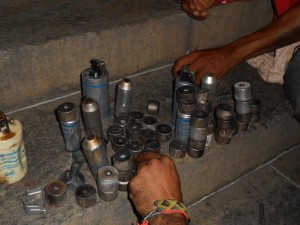 collection of various types of gas containers
collection of various types of gas containers
These episodes continue until late at night, the police also try to evict the occupation on the steps but they are greeted by unarmed people with hands up, severely weakened by the gas and then desist. About nine o’clock in the evening the situation seems calm, the police continues, the number of protesters descend slowly, I am also very tired and I go back home. Here some photos from the Globo website.
2nd October – the day after
Today there is an “act” against the police violence in Universidade Estadual do Rio de Janeiro – UERJ (Rio de Janeiro State University): it is not clear if it a march or a static demonstration or a public meeting. I come because I received the item by word of mouth, as well as many other initiatives that I witnessed here in Rio. At the University there are no signs of the event and try to ask for information, only after numerous phone calls and questions, I can find out after both: classic Brazilian organization. I check the auditorium and I understand that it is an event that will have mixed modes: go down in the atrium on the first floor, we join up with a band of wind instruments and placards in hand, we begin to make a parade for the university, going up to the eleventh floor and down. We are about 200 persons (as you can count on a mass march through corridors?) and we arrive at the auditorium which is packed, all the people singing, shouting slogans, I have to sit on the floor on the steps. Now I estimate that we are more than 400 people, fully packed room! The audience is mainly composed of adults, teachers on strike and various social movements; there are also some university students.
A general overview of the auditorium
The atmosphere is electric: are interspersed with speeches of 3-4 minutes with slogans and music. All interventions are far-reaching, demanding an end to police or even the state, the slogans are shouted from the entire audience, a particular energy envelops the whole room. I’ve never seen something like that and the thing that touches me the most is that I’m not seeing a conclave crypto-extremist but an assembly of adult workers! The event goes ahead 3 hours and combative atmosphere does not change, in the end you decide to go in procession to the Aldeia Maracana occupied (oldest museum Indians under threat of demolition near the stadium Maracana). We are about fifty people and the Indians are a traditional rite around the fire for us: among old walls covered with graffiti, peeling wooden beams, all of us in a circle around a small fire particular smell (incense?), Witness to an Indian who performs a rite of hundreds of years old, accompanied by the sound of traditional instruments and all of us who are fighting on foot to the beat. The songs fall and we divide into small groups, I am knackered and return to the house: they are past 11; I 45 min by metro and I have yet to make me dinner. I console myself with the idea that I had the privilege and good fortune to attend a meeting incredible and then to a ritual that I do not know how many Europeans have had the good fortune to see. Throughout the evening I felt the energy of people genuinely believe they can change the world, where the concept of solidarity has managed to tie workers, students, Indians, all joined together. Although not the first popular assembly that I frequent, tonight , for the umpteenth time , I feel that something is really going on , people are really convinced and do not see the end of this wonderful energy .
3rd October – national health care system
Today I had the chance to touch with hands the Brazilian national health care system. During the morning I discover that the girl who is hosting me has a strong intestinal pain. After few hours we decide to go together to a first-aid post. My friend is admitted in after an hour, I’m left out. After two hours I am called in, she is hospitalized and monitored. The situation appears to be serious, it is not clear, but she is suspected of appendicitis. The doctor decides to do further tests at a hospital and I am allowed to go with them: let’s go in the ambulance with sirens blaring ! I have an experience of first aid, I am a volunteer of the Red Cross ambulance in Italy, and the trip in the traffic of Rio de Janeiro is incredible: the bottom of the road totally is ruined, we are stucked in traffic ( and the cars do not move ) when there is no traffic we have incredibly high speed.
In the hospital the situation is absurd: my friend bounces in various offices, to make the various examinations, times are getting longer. No doctor at the hospital takes responsibility for signing the diagnosis, it is 6 pm and we decide to return to the first-aid post. During the journey the ambulance receives the call to another emergency and the journey becomes even more hectic. When we get my friend still does not know what the diagnosis is and continues with painkillers. I am tired, a friend gives me a change after 7 am and return to my home, having seen at first hand the Brazilian health system dysfunction. Medical facilities seem old, the local public hospital are dirty, things are very long and the time for answers are biblical, medical staff is insufficient and in emergency cases seem really serious and more diverse. (The next day I learn that the girl spent the night in the place of first aid, it was not appendicitis, food poisoning is suspected).
Week end
The week goes quiet, meeting people and trying to rest. Finally I decided to move to a new house: my friend has decided to offer me a small room in her apartment in Vila Isabel, the same area where I lived previously. As I learned from previous (tragic) experiences, the house in fieldwork is fundamental: it has to be a place where you can be quiet, feel (and be!) safe, compulsorily with Internet, as to avoid long trip to internet café. The new house is perfect: clean, with a very kind housemate, with enough space, in a nice neighbourhood that I already know; the only thing is that is slightly far from the city centre, I will have to spend a bit more on the public transports.
